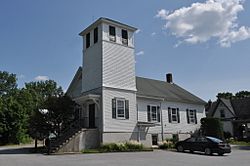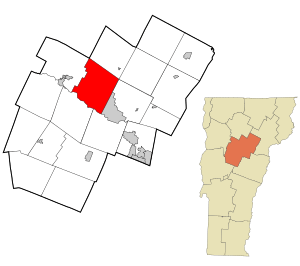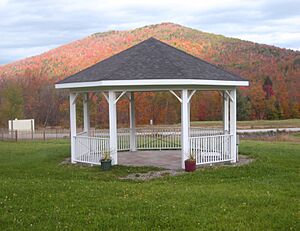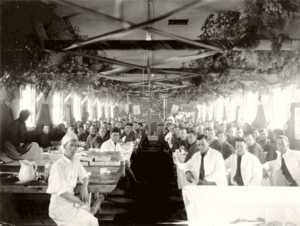Middlesex, Vermont facts for kids
Quick facts for kids
Middlesex, Vermont
|
|
|---|---|

Middlesex Town Hall in Middlesex Village
|
|

Location in Washington County and the state of Vermont
|
|
| Country | United States |
| State | Vermont |
| County | Washington |
| Communities |
|
| Area | |
| • Total | 39.9 sq mi (103.2 km2) |
| • Land | 39.7 sq mi (102.7 km2) |
| • Water | 0.2 sq mi (0.5 km2) |
| Elevation | 797 ft (243 m) |
| Population
(2020)
|
|
| • Total | 1,779 |
| • Density | 44.59/sq mi (17.238/km2) |
| Time zone | UTC-5 (Eastern (EST)) |
| • Summer (DST) | UTC-4 (EDT) |
| ZIP Codes |
05602 (Middlesex)
05682 (Worcester) |
| Area code(s) | 802 |
| FIPS code | 50-44500 |
| GNIS feature ID | 1462147 |
Middlesex is a small and friendly town located in Washington County, Vermont, United States. In 2020, about 1,779 people lived there. It's a place with a rich history and beautiful natural surroundings.
Contents
Geography of Middlesex
Middlesex covers an area of about 39.9 square miles (103.2 square kilometers). Most of this area, about 39.7 square miles (102.7 square kilometers), is land. The rest, a small part of 0.2 square miles (0.5 square kilometers), is water.
History of Middlesex
How Middlesex Got Its Name
The town of Middlesex was officially created on June 8, 1763, by a special document called a royal charter. This charter was given by Governor Benning Wentworth of New Hampshire. The town's borders were set next to two other towns, Waterbury and Worcester, which were also created around the same time.
No one is completely sure how Middlesex got its name. One idea is that Governor Wentworth chose the name because the town is located between Waterbury and Worcester. Another idea is that he named it after an English nobleman, Charles Sackville, who was known as Lord Middlesex.
Early Settlers and Villages
For many years, Middlesex remained a quiet place with not many people living there. The first settlements grew in areas like Middlesex village and Putnamville. The Putnam family was one of the first families to settle in the town. Seth Putnam became the first town clerk in 1790. His brothers, Isaac and Jacob Putnam, worked as town surveyors.
Middlesex village is the main settlement in town. It is located along the Winooski River and is where the town hall is found. This village even had its own post office from 1821 until 1966.
Middlesex Center is located, as its name suggests, near the middle of the town. Shady Rill is an area with rolling hills and lowlands. Here, three brooks named Herrick, Martins, and Patterson meet. A Baptist church was built in Shady Rill in 1849.
Putnamville village is on the eastern side of the town, along the North Branch River. There was once a waterfall here that powered mills for grinding grain and cutting wood. Putnamville also had a post office from 1882 to 1935.
Wrightsville and Tangletown
Wrightsville, located south of Putnamville, used to be a busy settlement with many buildings and mills. However, a big flood in 1927 caused a lot of damage. To prevent future floods, the Civilian Conservation Corps (CCC) built the Wrightsville Dam between 1933 and 1935. Because of the dam, the settlement of Wrightsville had to be moved. Many houses were moved to a new location, and even the Northbranch Cemetery was relocated.
Near Wrightsville is an area called Tangletown. It got this nickname because the woods there were so thick and looked so similar that early settlers often got "tangled up" or lost in the area.
Wildlife and Economy
Middlesex used to have a large population of black bears in the 1800s. There's a story about a farmer who found one of his sheep killed by a bear. He and his wife went to check their other sheep and ended up seeing and shooting three bears! Because of these encounters, the area became known as Beartown.
For most of the 1800s and into the mid-1900s, farming was the main way people made a living in Middlesex. People were involved in dairy farming, raising sheep for wool, logging, growing fruit in orchards, and making maple syrup. After World War II, the town slowly changed. Many people who lived in Middlesex started working in other nearby towns, especially Montpelier, and just lived in Middlesex.
Population of Middlesex
Middlesex has seen its population grow over the years. Here's how the number of people living in the town has changed:
| Historical population | |||
|---|---|---|---|
| Census | Pop. | %± | |
| 1800 | 262 | — | |
| 1810 | 401 | 53.1% | |
| 1820 | 726 | 81.0% | |
| 1830 | 1,156 | 59.2% | |
| 1840 | 1,270 | 9.9% | |
| 1850 | 1,365 | 7.5% | |
| 1860 | 1,254 | −8.1% | |
| 1870 | 1,171 | −6.6% | |
| 1880 | 1,087 | −7.2% | |
| 1890 | 889 | −18.2% | |
| 1900 | 883 | −0.7% | |
| 1910 | 858 | −2.8% | |
| 1920 | 762 | −11.2% | |
| 1930 | 751 | −1.4% | |
| 1940 | 817 | 8.8% | |
| 1950 | 887 | 8.6% | |
| 1960 | 770 | −13.2% | |
| 1970 | 857 | 11.3% | |
| 1980 | 1,235 | 44.1% | |
| 1990 | 1,514 | 22.6% | |
| 2000 | 1,729 | 14.2% | |
| 2010 | 1,731 | 0.1% | |
| 2020 | 1,779 | 2.8% | |
| U.S. Decennial Census | |||
In 2000, the average age of people in Middlesex was 39 years old. About 26.5% of the population was under 18 years old.
Notable People from Middlesex
Many interesting people have connections to Middlesex. Here are a few:
- George W. Bailey Jr., who served as the Secretary of State of Vermont.
- David Carkeet, a writer known for his funny novels.
- Robert M. Fisher (1928–2007), a talented artist.
- Denise R. Johnson, the first woman to be appointed to the Vermont Supreme Court.
- Patrick Leahy, a Democratic US senator from Vermont.
- Scudder Parker, a Vermont state senator.
- Anthony Pollina, another Vermont state senator.
- Edson A. Putnam, who was a Wisconsin State Assemblyman.
- Sarah Strohmeyer, an author famous for her "Bubbles Yablonsky" book series.
See also
 In Spanish: Middlesex (Vermont) para niños
In Spanish: Middlesex (Vermont) para niños
 | Aurelia Browder |
 | Nannie Helen Burroughs |
 | Michelle Alexander |




